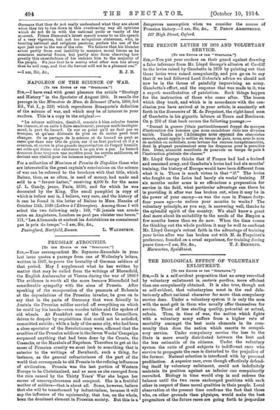NAPOLEON ON THE SCIENCE OF WAR.
[To THE EDITOR OP THE " SFECTATOR."1 SIR,—I have read with great pleasure the article "Strategy and History " in the Spectator of August 29th. It recalls the passage in the Mhnoires de Mme. de Remusat (Paris, 1880,3rd Ed., Vol. I., p. 333) which reproduces Bonaparte's definition of the science of war, and which may be of interest to your readers. This is a copy in the original :— " La science militaire, disait-il, consisto h bien calculer toutes lea chances, et en suite a faire exactement, presque mathematique- ment, In part du hasard. Ce cur ce point qu'il ne faut pas se tromper, et qu'une decimal° do plus on de moires pout tout changer. Or ea portage de la science et du hasard ne peut se eager que dans une tete de genie, car it en faut partout ou it y a creation, et certes la plus grand° improvisation do l'esprit humain est cello qui donne tine existence h ce qui n'en a pas. Lo hasard demeure done toujours une mystere poor les esprits mediocres, et devient une realite pour los hommes superieurs."
For a collection of Maximes et Pensees de Napole'on those who are interested in the great captain's conclusions on the science of war can be referred to the brochure with that title, which Balzac, then, as so often, in need of money, had made and sold to a " former hatter," receiving 4,000 fr. for the same (J. L. Gandy, jeune, Paris, 1838), and for which he was decorated by the King. The small pamphlet (a copy of which is before me) is, I believe, very rare, and the history of it can be found in the letter of Balzac to Mme. Hanska of October 15th, 1838 (Lettres a l'EtrangSre). Among these I will select the two following only : 169, " Si jamais une armee entre en Angleterre, Londres ne pout pas resister tine heure."
171, "Les Allemande et surtout lee Autrichiens ne connaissent pas le prix du temps."—I am, Sir, &o., Posingford, Llartfield, Sussex. L. WALDSTEIN.


































 Previous page
Previous page